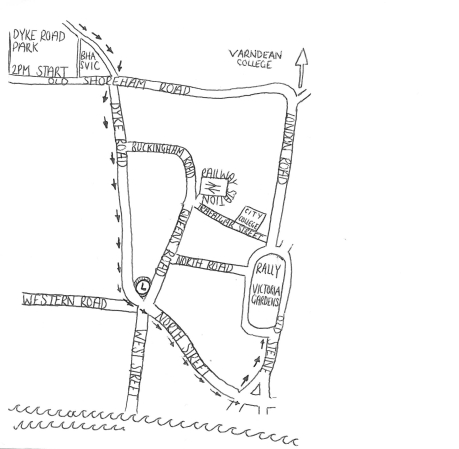What happened in Brighton?
November 25, 2010
The following aims to provide some basic materials for people who were involved or interested in the events of N24 to think about what happened there and what it means for them – and for next time. It’s based on numerous personal accounts, collated into a punch-by-punch narrative.
UPDATE: Brighton university occupation ongoing, running events. blog.
Headline events, for those who don’t want to wait until the end for the good stuff: 2500-3000 people at the peak; good mood on the demo, good reception, lots of conversation with passers-by; the official end-point was ignored; 1500 people went to try and occupy the Town Hall, were kettled there, broke out; then 500 of them went to occupy vodafone, looted Poundland, blocked roads, attacked a police station, then got dispersed and kettled on the sea-front.
There were six arrests.
What follows is a draft: it happened recently and, even though we’ve tried to get all the facts as straight as possible, there will be errors and omissions. We welcome corrections and additions: the more detail we have the clearer we can see, and think.
More texts, with detailed reflection on the role of the police and crowd dynamics, will hopefully follow.
Other sources:; Tom Wills photostream ; the Argus (includes minute-by-minute liveblog) ; indymedia; Nomoregames blog entry and twitter.
FIRST THE LETTER FROM HOGWARTS, THEN THIS
DUMBLEDORE WOULDN’T STAND FOR IT
TORY SCUMS
Article after the break. No PDF yet.
Arrests/repression
November 25, 2010
From the Argus:
Chief Superintendent Graham Bartlett said: “We anticipate more arrests over the coming days and weeks as the investigations continue.”
The following is the Police’s list of related arrests. We’ve got no reason to doubt their numbers. Note that ‘breach of the peace’ is not a crime. Obviously the following list doesn’t include all the little punches to the head and so on.
We’ll add details whenever we receive them.
- A 15-year old Brighton boy was arrested in Bartholomews for breach of the peace, and was bailed to December 2.
- A 15-year old Brighton boy was arrested in Carlton Hill for assault on police and obstructing police, and was bailed to December 4.
- A 15-year old Worthing girl was arrested in Madeira Drive for assault on police, obstructing police, and causing harassment and alarm and was bailed to December 17.
- A 16-year old Burgess Hill boy was arrested in Madeira Drive for causing harassment and alarm, and was bailed to December 17.
- A 16-year old Brighton boy was arrested in Madeira Drive for breach of the peace and bailed to 12 December.
- A 41-year old Brighton man was arrested in Prince Albert Street for assault on police and obstructing police, and was bailed to 17 December.
What’s Planned in Brighton?
November 23, 2010
UPDATE from a comment on the N24 Walkout page:
“Anonymous Stringer Pupil said (at November 23, 2010 at 10:57 pm)
This is to confirm of a mass stringer walkout
Despite our attendance in this group we estimate lots more.”

Since Wednesday the 10th people all over the country have been talking about the cuts and what they mean for us. Not just in the universities and the colleges: people are talking everywhere about welfare reform, pension reform, public sector job losses, everything. But it’s in education things are moving quickest: local November 24th events are being organised all over the country, with sixth-formers making links with university students everywhere.
Sixth-form and secondary school teachers are widely reported to be quietly encouraging discussion of the cuts amongst their students, and even participation in the N24 walkout, and the NUT executive has called on teachers not to discipline pupils taking part; 300 academics were even more explicit in a letter to the Guardian. Both are in the hard copy of the bulletin. In Brighton things are happening too. We’ve tried to clarify what’s planned.
MAIN PROPOSAL
Students from every school, college and university in Brighton to walk out from their institution – according to different timetables, information below – and meet at 2pm on Dyke Road – possibly Dyke Road Park? – near BHASVIC, for a march past Churchhill Square to Victoria Gardens. This route for the march has been negotiated with the police by the ‘Fight The Fees’ anti-cuts group.
COLLEGES
The different colleges have different plans and different problems. We don’t know all the details: we’ve specified what we’ve been able to find out. At BHASVIC, where the demo’s meeting, the consensus seems to be begin congregating from 1:20 pm, with a walkout at 2 for the demo – despite an effort by the principal to push it back to 2:45. Students at other colleges are going to walk out before 2 and go to Dyke Road Park.
UNIVERSITIES
Sussex students have organised a meet-up at the Falmer campus at 12 pm; then they’ll get the train into town for 1:45 and get to BHASVIC by 2. Brighton students are congregating at BHASVIC at 2.
SCHOOLS
Priory School looks set to walk out for a demo at 11am through Lewes, before coming into town – with Sussex students? – for the BHASVIC thing. There are signs on the internet of participation by Dorothy Stringer – and there are (insubstatial) rumours about mobilisation at Falmer School too.
DECLINE: what are the cuts?
November 19, 2010
DECLINE:
What are the proposed cuts?
What will their impact be?
The Government is well on the way to implementing a totally unprecedented cuts programme which will radically change what it’s like to live and work in Britain. Every government department will have its budget cut by a greater or smaller amount, in order to reduce overall government spending. All departments have now announced how they intend to make the savings demanded of them. The following attempts to clarify just what will change and in what way.
There is an effort by some political factions to contest the ‘necessity’ of these cuts. Lots of bright people have decided that they are necessary, to some degree, too. We don’t feel equipped to decide, although we’re trying to learn about it (and we think those who are interested should.) But we maintain that, in the case that these reforms strike us as monstrous, it is reasonable to start organising and thinking amongst ourselves about how to prevent them. It isn’t our job to manage the economy – but it may well be our duty to defend ourselves and our friends against attacks which seem quite likely to have a huge and largely negative effect on all of our lives. Whatever they do for the ‘economy’ five years from now. Meanwhile hundreds of thousands of workers are losing their jobs or taking cuts in hours which amount to wage cuts.
EDUCATION MAINTENANCE ALLOWANCE (see clarification)
The government have announced the abolition of the EMA, a means-tested payment of £30 per week made to 620,000 college students in exchange for their attendance at a further education (FE) institution. It’s necessary to look at this cut in the context of welfare cuts and the huge scale of redundancies still underway, which are reducing families’ ability to support their children through FE. This amounts to a huge attack on the poorest; it’s also worth noting that anyone forced to leave college by these changes will then have to deal with the worst job market in decades or a dole system rapidly being turned into a hellish pit (otherwise known as ‘welfare’, discussed below.) EMA (budget £550m) will be replaced by an as-yet unspecified £50m “targeted” programme, distributed by local authorities to those in the direst need.
WELFARE
Welfare reform, begun by the Labour government 15 years ago, is aimed at making being unemployed so unbearable that people become willing to take any job. Labour Party reforms (notably the 2009 Welfare Reform Act) have been going this way for a long time; the new Tory programme is the same thing but starker, more unashamed. It’s important to recognise that this isn’t just targeted against the long-term jobless: this will affect everyone who loses a job and struggles to find a new one, and their families and other dependents.
The headline reforms are: suspension of Job-seeker’s Allowance for anything between 3 months and 3 years if any work whatever is refused; powers to impose up to 30 hours of forced labour per week on JSA recipients as a condition of receipt of the benefit; absolute caps on housing benefit which will force many families to move home, and an increase from 25 to 35 of the age when full housing benefit will be paid; the combination of working tax credit, child tax credit, housing benefit, income support and job seekers’ allowance into a ‘universal benefit’ that will be capped at £26,000 per annum for any family, no matter how large; and sickness benefit limited to a maximum of 6 months, with a new emphasis on ‘fitness to work’ rather than ‘illness’ which will give the (privatised) JobCentre much more latitude to force people back into work. Meanwhile, new council house tenants face a huge increase in rent, to 80% of market rates.
The government wants to make sure it ‘always pays to work’. But the crisis has caused huge losses of jobs, public and private. Most of the jobs created in the last boom were in the public sector which is now being attacked, with hundreds of thousands of redundancies planned. The government believes that the private sector will grow to replace those jobs, but there is little sign of that happening yet. Meanwhile everyone sacked or struggling to find work is in for a tough time. The government’s aim: ensure that people will take any job, no matter how bad, in order to escape the punitive disciplinary systems they’re putting in place. The system’s guaranteed to be there but the jobs aren’t.
PENSIONS
The age the state pension will begin to be paid will be increased to 67 by 2016. But most people won’t work those extra 2 years: they’ll just have to save more from their wages on the way there, if they have wages. So it amounts to a wage cut or the curse of a few more years in the welfare system before the very sparse state benefit starts.
HIGHER EDUCATION
Fees are scheduled to treble to £9000 per year at most universities, payable with a loan issued at market rates of interest, to be paid back after graduation. These increases are widely seen as a stepping-stone to a total removal of the fees cap. Government funding for undergraduate teaching will be cut from £4.9bn to £700m for ‘core subjects’ (Medecine and the Sciences), meaning the state will no longer fund most teaching in the universities, and the survival of mass teaching outside those core subjects is radically put into question. It’s highly likely that arts and humanities teaching will retreat to its elite centres (Oxford, Cambridge, London: which means far fewer places to study non-core subjects) while new market mechanisms force students to study degrees which will offer them ‘value for money’ – high wages. It’s the end, for better or worse, of the autonomy of HE from the market. Meanwhile many, many academic and non-academic jobs will be lost or made harder across the country as universities adjust to this new market-led reality.
Notes On Organisation
November 19, 2010
From BTON 1:

Some of us have been through a few long & difficult political struggles. We want to offer you some of the things we think we learned, for you to think about, criticise, reject or adopt in your own efforts to organise.
::Keep safe. Maintain open communication with people you trust and have your meetings in secure, well known spaces. There’s no need to be paranoid, but know your surroundings and your friends.
::Try to rely on argument and intelligence. Slogans are a staple for all sorts of political factions, but we’ve seen them alienate many more people than they’ve won over. Be smart, be funny, be approachable, and a lot of the resistance you might have come up against will start to soften.
::Don’t get isolated. You’re surrounded by people who are angry and sad about what’s going on, inside and outside of your sixth form; but they keep quiet most of the time: that could be the basis for a huge movement in the coming weeks and months. But the same issues don’t affect everyone, and not everyone can act like a student. So talk to people, find out how they feel about the situation – and what they might like to do. There are one thousand reasons for walking out and doing more (and reasons not to, as well.)
::Have confidence in your judgement. Don’t be afraid to back out of a situation which you no longer agree with. Things move quickly, they can get out of control and you should never be told that maintaining a critical stance is a bad thing or is letting people down. Remember that a good group is a collection of individuals working together.
::Consider the possibility that political activity could be a condition of happiness. Be wary of ways of acting that only feel like a burden – and ways of discussing which always feel like placing a burden on others. They don’t often go anywhere pleasant.
When will the cuts happen?
November 19, 2010
When this has been handed out people have been asking about the precise timetable for the cuts. In some cases – as with university fees – this has been specified in the last budget (students starting 2012); in others it hasn’t, and isn’t clear. There has not, for instance, been any public notice we were able to find specifying when EMA would be cut. The idea’s floating around that it could be after Christmas but the only semi-official thing to mention it that we could find was this article by an FE NUS type. He doesn’t cite any sources so in the cirumstances we should just admit that we don’t know. But it’s unlikely to be until next year at the earliest, if not the same year as £9k fees, 2012.
We want to try and clarify the timing of some of the other reforms mentioned in the text ‘decline’. We’ll try to over the next few days.
First Bulletin
November 16, 2010
The first bulletin will be circulated by hand only. A change of policy on a whim. A copy of the text will be put up article-by article on the blog in the next day or so.
DECLINE: what are the proposed cuts?
Notes on Organisation
We will also be publishing a series of clarifications in the next few days, in response to difficult questions we’re asked. The first makes a first effort to deal with just when the cuts will happen. (A more extensive contribution should be made over the weekend.)
